Author: Eliza Kurcevic, Membership and Program Officer, EHRA
This year, during the International Harm Reduction Conference there was plenty discussions, workshops and exchanges of experiences about drug checking services. The more experienced organizations were speaking about the positive results of this harm reduction service, as well about the need to make it more accessible for people who use drugs, while organizations, which just started drug checking, were sharing the barriers and challenges they face while providing this service.
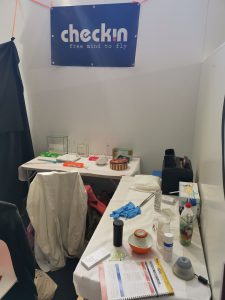 Up to December 2018, 888 new psychoactive substances have been reported to the UNODC Early Warning Advisory[1]. This number just proves, that the manufacture of the illegal drug market is diverse and there is no guarantee of the quality or composition of drug. Through all the centuries people used drugs and they will be using. But maybe it’s time to ensure the safety of people who use drugs? Nowadays, lots of drugs possibly contain adulterants and contaminants, which sometimes can lead to the unintended consequences for the health. And while our governments don’t want to protect citizens by regulating drug markets, then at least what they can do, is to support drug checking services, which aim for improving health and safety of people who use psychoactive substances.
Up to December 2018, 888 new psychoactive substances have been reported to the UNODC Early Warning Advisory[1]. This number just proves, that the manufacture of the illegal drug market is diverse and there is no guarantee of the quality or composition of drug. Through all the centuries people used drugs and they will be using. But maybe it’s time to ensure the safety of people who use drugs? Nowadays, lots of drugs possibly contain adulterants and contaminants, which sometimes can lead to the unintended consequences for the health. And while our governments don’t want to protect citizens by regulating drug markets, then at least what they can do, is to support drug checking services, which aim for improving health and safety of people who use psychoactive substances.
Speaking about CEECA region, it should be said, that few years ago, drug checking was something “new”, “odd”, but now more and more harm reduction advocates speak about it, as an integral part of the existing harm reduction services. Lots of people know, that the most accessible way to check psychoactive substance is to check it with the reagent kit, which can be purchased online. You buy what you need (there are many different reagent kits[2]), supplier send it by mail, you receive and check it in the safe environment. More professional option is to check drug in the laboratory with special technologies, but unfortunately in CEECA region it seems, that only law enforcement agencies can check your drugs…when you are arrested. Doesn’t sound good, right? So let’s take a look into the experience of the organization, which do drug checking with reagent kits during music festivals, what are the pros and cons of reagent tests and why do we need drug checking?
What we shall know about drug checking?
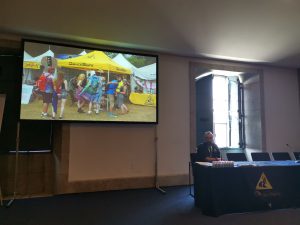 Probably the most important rule, which was also several times noted by Mitchell Gomez (Executive Director of “DanceSafe”) during the workshop “Reagent drug checking as an underground harm reduction practice”, is that drug checking is a harm reduction, but not harm elimination. It is important to understand and use this messaging while explaining about drug checking (as well, as about distribution of other drug paraphernalia). Drug checking won’t eliminate the harm, which some of the drugs can cause, but it can help person who uses drugs to avoid ingesting unknown or potentially dangerous adulterants. As well, it can warn person about possible risks and let person to decide about safety measures, which should be taken while using particular drug. It’s better to use test kit, then not to do so at all. And while our national laws (in most of CEECA countries) do not give a possibility for the laboratory analysis of substance, it’s vitally important to use reagent checking to save lifes and to move the discussions around positive results/effects of the drug checking.
Probably the most important rule, which was also several times noted by Mitchell Gomez (Executive Director of “DanceSafe”) during the workshop “Reagent drug checking as an underground harm reduction practice”, is that drug checking is a harm reduction, but not harm elimination. It is important to understand and use this messaging while explaining about drug checking (as well, as about distribution of other drug paraphernalia). Drug checking won’t eliminate the harm, which some of the drugs can cause, but it can help person who uses drugs to avoid ingesting unknown or potentially dangerous adulterants. As well, it can warn person about possible risks and let person to decide about safety measures, which should be taken while using particular drug. It’s better to use test kit, then not to do so at all. And while our national laws (in most of CEECA countries) do not give a possibility for the laboratory analysis of substance, it’s vitally important to use reagent checking to save lifes and to move the discussions around positive results/effects of the drug checking.
Drug checking is an integral part of harm reduction services, which means that person will not only get information on the tested drug, but also will be given nonjudgmental and fact-based information on potential harms and risks, as well as ways to minimize it, and will be able to get drug paraphernalia. In the workshop, Mitchell shared “DanceSafe” 20 years experience in providing pill testing services at electronic music events in US and Canada. During these events, “DanceSafe” is 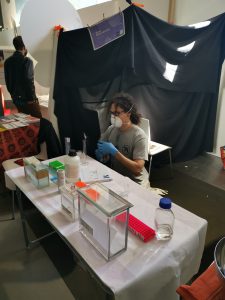 providing onsite pill testing (with reagent tests), but also is distributing earplugs, condoms, free water, electrolytes. This year for the first time they were giving “Narcan” (Naloxone). And of course, they are providing non-bias drug education and appropriate harm reduction messaging. During such a long experience of work – they never were arrested for the drug checking, nor for the distribution of drug paraphernalia. “DanceSafe” created a good relations and agreements with festival organizers and is communicating with the local police, that drug checking is not a service, which encourages drug use. It’s a service, which in most of the cases is accessed by people who already have a decision made to use drugs. So why not to make it safe?
providing onsite pill testing (with reagent tests), but also is distributing earplugs, condoms, free water, electrolytes. This year for the first time they were giving “Narcan” (Naloxone). And of course, they are providing non-bias drug education and appropriate harm reduction messaging. During such a long experience of work – they never were arrested for the drug checking, nor for the distribution of drug paraphernalia. “DanceSafe” created a good relations and agreements with festival organizers and is communicating with the local police, that drug checking is not a service, which encourages drug use. It’s a service, which in most of the cases is accessed by people who already have a decision made to use drugs. So why not to make it safe?
Reagent tests: pros and cons
As I already mentioned above, one of the easiest and most accessible way to check your drugs – it’s with reagent tests. Reagents are chemicals that change colour (are “colorimetric”), based on the presence of certain drugs. Advantages of such testing is:
- Easy-to-use, to manufacture or acquire;
- not expensive;
- the results are provided in minutes;
- no need for professional chemist to interpret the results (trained peer can explain the results);
- doesn’t need any special equipment, as well access to power or other infrastructure, which would be hard to get during the outdoor events;
- sometimes reagent tests can be used to identify adulterants;
- can be used as a “hook” for the education about drugs and harm reduction.
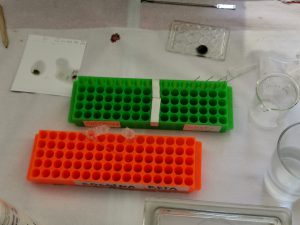 But it is also important to stress, that there are some limitations about drug checking:
But it is also important to stress, that there are some limitations about drug checking:
- interpretation of the test can be subjective – one person can interpret the colour change differently from another person;
- reagent tests can detect the presence of particular substance, but not the strength or purity;
- cannot differentiate a mixture of different substances;
- there is no test for the detection of fentanyl and fentanyl test stripes can detect only pharmaceutical fentanyl (street fentanyl cannot be detected).
Why do we need drug checking?
Use of psychoactive substances has been part of culture since time immemorial. There always had been and will be people, who will be using drugs for different reasons and purposes. So why not to make sure, that people know what they use? Drug checking services not only inform about potential risks and harms of use, but also enable people who choose to use drugs to make informed choices. If drugs are shown to contain unwanted or unknown chemical compounds, people might not to use them at all.
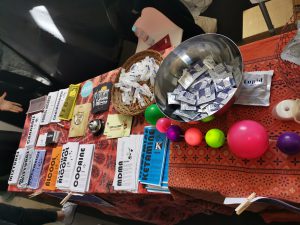 Law-enforcement responses, which criminalize people who use drugs has been proven to not work. For example, the presence of sniffer dogs at festivals is making people choose to take drugs earlier, faster or in higher quantities[3]. All this can lead to serious drug-related accidents. That’s why it is important to have integrated response, which includes all key stakeholders (including police, local and national decision makers). If authorities care about health and safety of people, they need to support drug checking and not to create barriers for the harm reduction organizations to provide such a services.
Law-enforcement responses, which criminalize people who use drugs has been proven to not work. For example, the presence of sniffer dogs at festivals is making people choose to take drugs earlier, faster or in higher quantities[3]. All this can lead to serious drug-related accidents. That’s why it is important to have integrated response, which includes all key stakeholders (including police, local and national decision makers). If authorities care about health and safety of people, they need to support drug checking and not to create barriers for the harm reduction organizations to provide such a services.
Drug checking is not only about knowing the drug to be used. It is integral part of the harm reduction services, which also provides information about blood-borne infections and its prevention, about overdoses prevention, information on the poly-drug use, drug paraphernalia, etc. In this case, drug checking works as creator of awareness and educates people on the minimization of risks.
Drug checking can become an effective tool, to monitor emerging new psychoactive substances, and create early warning system. It can help governments to increase the effectiveness of the response and implementation of warning campaigns.
And of course, drug checking is a cost-effective service. Basic reagent tests are of the low cost. But what is the most important, is that drug checking can work as an early intervention and offer full range of services for person who uses drugs: educational information, counselling, referral to treatment (if necessary).
***
Drug checking can be seen as controversial service, but it definitely corresponds to the safety and health of those, who use psychoactive substances. In some countries of our region it can take time to introduce drug checking as integrated part of harm reduction services, but…it’s worth it! To save lives of our beloved ones!
[1] https://www.unodc.org/LSS/Page/NPS
[2] The one we already checked in our work: https://dancesafe.org/shop/, https://shop.sin.org.pl/?lang=en, https://www.eztestkits.com/en/, https://www.pharmadrugtest.com/, https://bunkpolice.com/
[3] https://www.abc.net.au/triplej/programs/hack/sniffer-dogs-increase-risk-of-drug-overdoses-at-festivals/11078234

262 thoughts on “People Use Drugs. We Want To Know What Do We Use”
Comments are closed.